- Home
- Stephen Hawking
George's Secret Key to the Universe Page 2
George's Secret Key to the Universe Read online
Page 2
“That’s not poison,” said the girl scornfully. “That’s grape soda.”
George, whose parents only ever gave him cloudy, pale, fresh-squeezed fruit juices, suddenly felt very silly for not realizing what the purple stuff was.
“Well, this isn’t really your house, is it?” he continued, determined to get the better of her somehow. “It belongs to an old man with a long beard who disappeared years ago.”
“This is my house,” said the girl, her blue eyes flashing. “And I live here except when I’m dancing onstage.”
“Then where are your mom and dad?” demanded George.
“I don’t have any parents.” The girl’s pink lips stuck out in a pout. “I’m an orphan. I was found backstage wrapped up in a tutu. I’ve been adopted by the ballet. That’s why I’m such a talented dancer.” She sniffed loudly.
“Annie!” A man’s voice rang through the house. The girl stood very still.
“Annie!” They heard the voice again, coming closer. “Where are you, Annie?”
“Who’s that?” asked George suspiciously.
“That’s … uh … that’s …” She suddenly became very interested in her ballet shoes.
“Annie, there you are!” A tall man with messy dark hair and thick, heavy-framed glasses, set at a crooked angle on his nose, walked into the kitchen. “What have you been up to?”
“Oh!” The girl flashed him a brilliant smile. “I’ve just been giving the pig a drink of grape soda.”
A look of annoyance crossed the man’s face. “Annie,” he said patiently, “we’ve talked about this. There are times to make up stories. And there are times …” He trailed off as he caught sight of George standing in the corner and, next to him, a pig with purple stains around his snout and mouth that made him look as though he were smiling.
“Ah, a pig … in the kitchen … I see … ,” he said slowly, taking in the scene. “Sorry, Annie, I thought you were making things up again. Well, hello.” The man crossed the room to shake hands with George. Then he sort of patted the pig rather gingerly between the ears. “Hello … hi …” He seemed unsure what to say next.
“I’m George,” said George helpfully. “And this is my pig, Freddy.”
“Your pig,” the man echoed. He turned back to Annie, who shrugged and gave him an I-told-you-so look.
“I live next door,” George went on by way of explanation. “But my pig escaped through a hole in the fence, so I had to come and get him.”
“Of course!” The man smiled. “I was wondering how you got into the kitchen. My name is Eric—I’m Annie’s dad.” He pointed to the blond girl.
“Annie’s dad?” said George slyly, smiling at the girl. She stuck her nose up in the air and refused to meet his eye.
“We’re your new neighbors,” said Eric, gesturing around the kitchen, with its peeling wallpaper, moldy old tea bags, dripping faucets, and torn linoleum. “It’s a bit of a mess. We haven’t been here long. That’s why we haven’t met before.” Eric ruffled his dark hair and frowned. “Would you like something to drink? I gather Annie’s already given your pig something.”
“I’d love some grape soda,” said George quickly.
“None left,” said Annie, shaking her head. George’s face fell. It seemed very bad luck that even Freddy the pig should get to have nice drinks when he didn’t.
Eric opened a few cupboards in the kitchen, but they were all empty. He shrugged apologetically. “Glass of water?” he offered, pointing to the faucet.
George nodded. He wasn’t in a hurry to get home for his supper. Usually when he went to play with other kids, he went back to his own mom and dad feeling depressed by how peculiar they were. But this house seemed so odd that George felt quite cheerful. Finally he had found some people who were even odder than his own family. But just as he was thinking these happy thoughts, Eric went and spoiled it for him.
“It’s pretty dark,” he said, peering out of the window. “Do your parents know you’re here, George?” He picked up a telephone handset from the kitchen counter. “Let’s give them a call so they don’t worry about you.”
“Um … ,” said George awkwardly.
“What’s the number?” asked Eric, looking at him over the top of his glasses. “Or are they easier to reach on a cell phone?”
“They, um …” George could see no way out. “They don’t have any kind of phone,” he said in a rush.
“Why not?” said Annie, her blue eyes very round at the thought of not owning even a cell phone.
George squirmed a bit; both Annie and Eric were looking at him curiously, so he felt he had to explain. “They think technology is taking over the world,” he said very quickly. “And that we should try and live without it. They think that people—because of science and its discoveries—are polluting the planet with modern inventions.”
“Really?” Eric’s eyes sparkled behind his heavy glasses. “How very interesting.” At that moment the phone in his hand burst into tinkling song.
“Can I get it, can I get it? Pleasepleaseplease?” said Annie, grabbing the phone from him. “Mom!” And with a shriek of joy and a flounce of brightly colored costume, she shot out of the kitchen, phone clasped to her ear. “Guess what, Mom!” Her shrill voice rang out as she pattered along the hall corridor. “A strange boy came over …”
George went bright red with embarrassment.
“And he has a pig!” Annie’s voice carried perfectly back to the kitchen.
Eric peered at George and gently eased the kitchen door closed with his foot.
“And he’s never had grape soda!” Her fluting tones could still be heard through the shut door.
Eric turned on the faucet to get George a glass of water.
“And his parents don’t even have a phone!” Annie was fainter now, but they could still make out each painful word.
Eric flicked on the radio and music started playing. “So, George,” he said loudly, “where were we?”
“I don’t know,” whispered George, who could barely be heard in the din Eric had created in the kitchen to block out Annie’s telephone conversation.
Eric threw him a sympathetic glance. “Let me show you something fun,” he shouted, producing a plastic ruler from his pocket. He brandished it in front of George’s nose. “Do you know what this is?” he asked at top volume.
“A ruler?” said George. The answer seemed a bit too obvious.
“That’s right,” cried Eric, who was now rubbing the ruler against his hair. “Watch!” He held the ruler near the thin stream of water running from the faucet. As he did so, the stream of water bent in the air and flowed at an angle rather than straight down. Eric took the ruler away from the water and it ran down normally again. He gave the ruler to George, who rubbed it in his hair and put it close to the stream of water. The same thing happened.
“Is that magic?” yelled George with sudden excitement, completely distracted from Annie’s rudeness. “Are you a wizard?”
“Nope,” said Eric, putting the ruler back in his pocket as the water ran down in a long straight line once more. He turned off the faucet and switched off the radio. It was quiet now in the kitchen, and Annie could no longer be heard in the distance.
“That’s science, George,” said Eric, his whole face shining. “Science. The ruler steals electric charges from your hair when you rub the ruler through it. We can’t see the electric charges, but the stream of water can feel them.”
“Gosh, that’s amazing,” breathed George.
“It is,” agreed Eric. “Science is a wonderful and fascinating subject that helps us understand the world around us and all its marvels.”
“Are you a scientist?” asked George. He suddenly felt very confused.
“I am, yes,” replied Eric.
“Then how can that”—George pointed at the faucet—“be science when science is also killing the planet and everything on it? I don’t understand.”
“Ah, clever boy,” said Eric with
a flourish. “You’ve gotten right to the heart of the matter. I will answer your question, but to do so, first I need to tell you a bit about science itself. Science is a big word. It means explaining the world around us using our senses, our intelligence, and our powers of observation.”
“Are you sure?” asked George doubtfully.
“Very sure,” said Eric. “There are many different types of natural science, and they have many different uses. The one I work with is all about the How and the Why. How did it all begin—the Universe, the Solar System, our planet, life on Earth? What was there before it began? Where did it all come from? And how does it all work? And why? This is physics, George, exciting, brilliant, and fascinating physics.”
“But that’s really interesting!” exclaimed George. Eric was talking about all the questions he pestered his parents with—the ones they could never answer. He tried asking these big questions at school, but the answer he got most often was that he’d find out in his classes the following year. That wasn’t really the answer he was after.
“Should I go on?” Eric asked him, his eyebrows raised.
George was just about to say “Oh, yes, please,” when Freddy, who had been quiet and docile up till then, seemed to pick up on his excitement. He lumbered upright and, with a surprising spurt of speed, he dashed forward, ears flattened, hooves flying, toward the door.
“No-o-o-o-o!” cried Eric, throwing himself after the pig, who had barged through the kitchen door.
“Sto-o-o-op!” shouted George, rushing into the next room behind them.
“Oink oink oink oink oink oink!” squealed Freddy, who was obviously enjoying his day out enormously.
If George had thought the kitchen was untidy, then this next room was in a whole different dimension of messiness. It was filled with piles and piles of books, stacked up so high that some of the wobbly towers reached almost to the ceiling. As Freddy charged right through the middle of the room, notebooks, paperbacks, leather-bound tomes, and bits of paper flew up in a tornado around him.
“Catch him!” shouted Eric, who was trying to drive the pig back toward the kitchen.
“I’m trying!” George shouted back as he was batted in the face by a shiny-jacketed book.
“Hurry!” said Eric. “We must get him out of here.”
With a great leap, Annie’s dad hurled himself right onto Freddy’s back and grabbed his ears. Using them as a sort of steering wheel, he turned the pig—who was still moving at quite some speed—and rode him like a bucking bronco through the door and back into the kitchen.
Left alone, George looked around in wonder. He had never been in a room like this before. Not only was it beautifully, gloriously messy as all the papers flying about in the air came gently down to the ground, but it was also full of exciting objects.
On the wall, a huge blackboard covered with symbols and squiggles in colored chalk caught his eye. It also had lots of writing on it, but George didn’t stop to read it. There were too many other things to look at. In the corner, a grandfather clock ticked slowly, the noise of the swinging pendulum clicking in time with a row of silvery balls suspended on very fine wire that seemed to be in perpetual motion. On a wooden stand was a long brass tube that pointed up toward the window. It looked old and beautiful, and George couldn’t resist touching the metal, which felt cool and soft at the same time.
Eric walked back into the room with his shirt untucked, his hair standing on end, his glasses at a strange angle, and a huge smile on his face. In his hand he held a book, which he had caught while riding Freddy out of the room.
“George, this is incredible!” Eric looked thrilled. “I thought I’d lost it—it’s my new book! I couldn’t find it anywhere. And now your pig has found it for me! What a result!”
George just stood there, hand on the metal tube, staring at Eric openmouthed. He’d been expecting to get into trouble for the damage his pig had wreaked. But Eric didn’t even seem angry. He wasn’t like anyone George had ever met—he never seemed to get angry, no matter what happened in his house. It was all very baffling.
“So I must thank you for all your help today,” continued the peculiar Eric, putting the lost book on top of a cardboard box.
“Help?” echoed George faintly, who couldn’t quite believe what he was hearing.
“Yes, help,” said Eric firmly. “As you seem so interested in science, perhaps I could tell you a bit more about it, by way of a thank-you. Where shall we start? What would you like to know?”
George’s mind was so full of questions that he found it hard to pick just one. Instead, he pointed at the metal tube. “What’s this?” he asked.
“Good choice, George, good choice,” said Eric happily. “That’s my telescope. It’s a very old one—four hundred years ago, it belonged to a man called Galileo. He lived in Italy, and he loved looking up at the sky at night. At that time, people believed that all the planets in our Solar System went around the Earth—even the Sun, they thought, orbited our planet.”
“But I know that’s not true,” said George, putting his eye to the old telescope. “I know that the Earth goes around the Sun.”
“You do now,” said Eric. “Science is also about gaining knowledge through experience—you know that fact because Galileo discovered it all those years ago. By looking through his telescope, he realized that the Earth and all the other planets in the Solar System orbit the Sun. Can you see anything?”
“I can see the Moon,” said George, squinting up the telescope, which was angled up to look out of the living room window into the evening sky. “It looks like it’s smiling.”
“Those are scars from a violent past, the impacts of meteorites that crashed on the surface,” said Eric. “You can’t see very far with Galileo’s telescope, but if you went to an observatory and looked through a really big telescope, you would be able to see stars billions and billions of miles away—stars so far away that by the time their light reaches our planet, they may actually already be dead.”
“Can a star die? Really?” asked George.
“Oh yes,” said Eric. “But first I want to show you how a star is born, and then we’ll take a look at how it dies. Hang on a minute, George, while I get everything set up. I think you’re going to like this.”
OUR MOON
A moon is a natural satellite of a planet.
A satellite is an object that goes around a planet—like the Earth, which goes around the Sun—and natural means that it is not man-made.
Average distance from the Earth: 238,854 miles (384,399 kilometers)
Diameter: 2,160 miles (3,476 km), which is 27.3% of Earth’s diameter Surface area: 0.074 × Earth’s surface area Volume: 0.020 × Earth’s volume Mass: 0.0123 × Earth’s mass Gravity at the equator: 16.54% of Earth’s gravity at Earth’s equator
The most obvious effect the Moon’s gravity has on the Earth is the tides of the oceans. The sea on the side of the Earth facing the Moon is pulled harder towards the Moon because it is closer. This raises a bulge in the sea on that side. Similarly, the sea on the side away from the Moon is pulled towards the Moon less than the Earth because it is farther away. This creates another bulge in the sea on the other side of the Earth.
Even though the Sun’s gravitational pull is much stronger than the Moon’s, it has only about half the Moon’s effect on the tides because it is so much farther away. When the Moon is roughly in line with the Earth and the Sun, the Moon and the Sun tides combine to produce the large tides (called “spring tides”) twice a month.
There is no atmosphere on the Moon, so the sky there is black, even during the day. And there hasn’t been an earthquake or a volcanic eruption there since around the time life began on Earth. So all living organisms that have ever been on the Earth have seen exactly the same features on the Moon.
From Earth, we always see the same side of the Moon. The first pictures of the Moon’s hidden side were taken by a spacecraft in 1959.
LIGHT & STARS
E
verything in our Universe takes time to travel, even light.
In space, light always travels at the maximum speed that is possible: 186,000 miles per second (300,000 km per second). This speed is called the speed of light.
It takes light only about 1.3 seconds to travel from Earth to the Moon.
Our Sun is farther away from us than our Moon is. When light leaves the Sun, it takes about 8 minutes and 30 seconds to reach us on Earth.
The other stars in the sky are much, much farther away from Earth than the Sun. The closest one after the Sun is called Proxima Centauri, and it takes 4.22 years for light from it to reach Earth.
All other stars are even farther away. The light of almost all the stars we can see in the night sky has been traveling for hundreds, thousands, or even tens of thousands of years before reaching our eyes. Even though we see them, some of these stars may not exist anymore, but we do not know it yet because the light of their explosion when they die has yet to reach us.
Distances in space can be measured in terms of light-years, which is the distance light travels in one year. A light-year is almost 6,000 billion miles (around 9,500 billion km).
© ANGLO-AUSTRALIAN OBSERVATORY/DSS/DAVID MALIN IMAGES
Proxima Centauri, the closest star to the Earth after our Sun
Eric walked toward the doorway and stuck his head out into the hallway. “Ann-ie!” he shouted up the stairs.
“Ye-e-e-es,” her distant voice tinkled down to them.
“Do you want to come and see The Birth and Death of a Star?” called Eric.
“Seen it already,” she sang back. “Lots of times.” They heard her feet pattering down the stairs, and a second later she stuck her head around the door. “Can I have some potato chips?”
“If we have any,” replied Eric. “And if we do, you’re to bring them into my library and share them with George. Okay?”
Annie smiled sweetly and disappeared into the kitchen. They heard the noise of cupboard doors being flung open.
“Don’t mind Annie,” said Eric gently, without looking at George. “She doesn’t mean any harm. She’s just …” He trailed off and went over to the far corner of the room, where he started fiddling around with a computer George hadn’t noticed before. He’d been too fascinated by the other objects to look at the flat silver screen with its keyboard attached. It was strange that George hadn’t spotted the computer right away—he really wished he could persuade his mom and dad to buy him one. He was saving up his allowance for a computer, but at the current rate, he calculated it was going to take him about eight years to afford even a really junky secondhand one. So instead, he had to use the clunky, slow, old machines at school, which crashed every five minutes and had sticky fingerprints all over the screen.

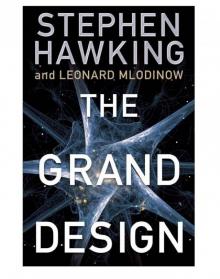 The Grand Design
The Grand Design A Brief History of Time
A Brief History of Time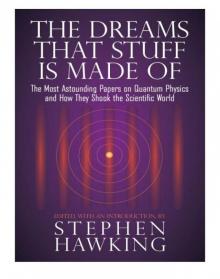 The Dreams That Stuff is Made of
The Dreams That Stuff is Made of My Brief History
My Brief History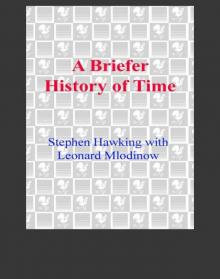 A Briefer History of Time
A Briefer History of Time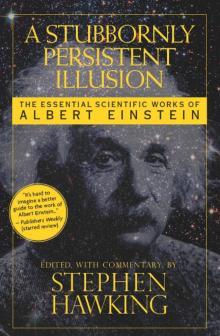 A Stubbornly Persistent Illusion
A Stubbornly Persistent Illusion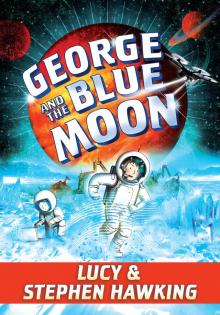 George and the Blue Moon
George and the Blue Moon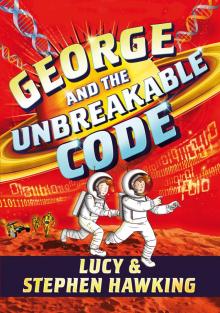 George and the Unbreakable Code
George and the Unbreakable Code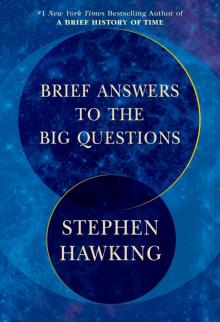 Brief Answers to the Big Questions
Brief Answers to the Big Questions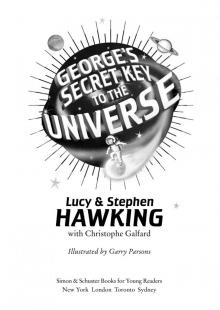 George's Secret Key to the Universe
George's Secret Key to the Universe